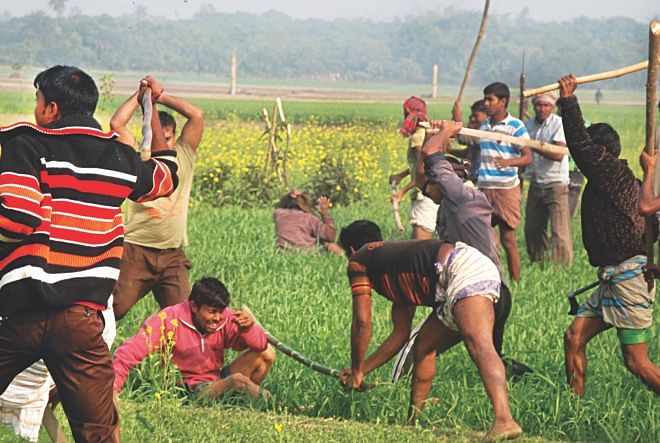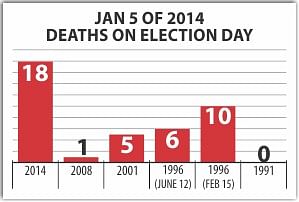Turnout low in deadliest polls

It was the bloodiest election in Bangladesh.
Intense localised violence leading to at least 18 deaths, very low voter turnout and high tension sum up the 10th general election held yesterday.
Enthusiasm among voters was little, as the outcome of the polls had already been known weeks before.
In a one-sided election boycotted by the BNP and without any opponents of note, the ruling Awami League has already sealed a two-thirds majority by securing at least 74 seats in the 147 constituencies that went to the polls yesterday.

The Jatiya Party won 12 seats, the Workers Party three, the Jatiya Samajtantrik Dal two and independent candidates seven, according to early results. The fate of the remaining 49 seats was yet to be known.
Candidates in 153 of the total 300 parliamentary seats have already been elected unopposed.
The AL is now free to form a new government any time. Indications are there it would form the government at the earliest by dissolving the current parliament whose tenure expires on January 24.
But the hope for a return of peace is bleak, as the BNP has announced another spell of hartal from today. The country has already witnessed 26 days of shutdown in December alone.
And immediately after the election was over, Jamaat men swooped on the Hindus in a Jessore village, ransacking and looting 130 houses to punish them for casting ballots.
In an instant reaction after the election, BNP Chairperson's Adviser Osman Faruk said the low turnout proved that people had boycotted the “farcical” election.
International reactions are yet to come. The US and the EU have already made it known that they don't support such an election and that they wanted BNP's participation in the polls.
In 26 districts, opposition activists, mostly Jamaat-Shibir men, took to the streets to thwart the election. And law enforcers were quick to swing into action.
In Dinajpur, Jamaat men cut off an Ansar member from his group and beat him to death. In three districts, 48 centres were burned down since the night before the election day.
Jamaat was more desperate to resist the polls, as it believes many of its top leaders, convicted of war crimes, might be hanged if the AL returns to power through this election. One of their leaders, Abdul Quader Mollah, walked the gallows last month for committing crimes against humanity during the 1971 Liberation War.

The capital wore a deserted look yesterday with only a few vehicles plying the streets. People hunkered down at homes in fear of violence, which, however, didn't occur.
The Daily Star found that there had been only a few incidents of vote rigging in the capital and elsewhere. Over the last few days, the AL high-ups had instructed all their leaders and activists to bring as many voters as possible to the polling stations.
The AL claimed it had proved that free, fair and acceptable polls are possible under a political government.
Voter turnout dipped from the highest of 87 percent just five years ago to around 30 percent yesterday, pushing it closer to the controversial February 15 election of 1996 when only 26.5 percent cast ballots.
In at least 41 centres in 11 districts, not a single ballot was cast.
Chief Election Commissioner Kazi Rakibuddin Ahmad blamed the thin presence of voters on the boycott of the election by the opposition and the cold foggy weather.
The election also proved to be the deadliest in the country's history with 18 deaths so far. In the February 1996 polls, 10 people lost their lives in violence.
The violence and election boycott have their roots in the AL-led government's cancellation of the caretaker government system in 2011 that Bangladesh boasted as a formula to hold credible elections in sharply divided politics.
The BNP and its allies rejected the scrapping of the system and resorted to widespread violence and shutdowns for its restoration.

 For all latest news, follow The Daily Star's Google News channel.
For all latest news, follow The Daily Star's Google News channel. 




Comments